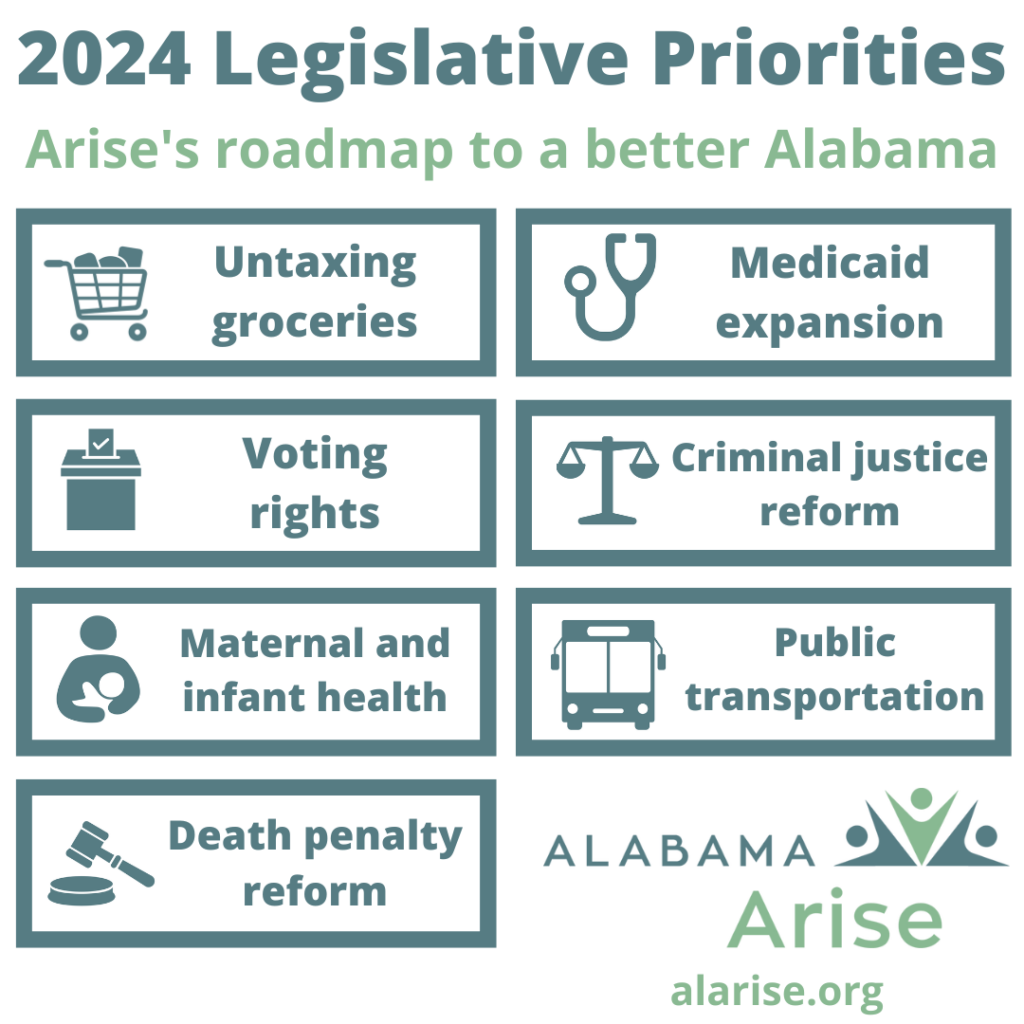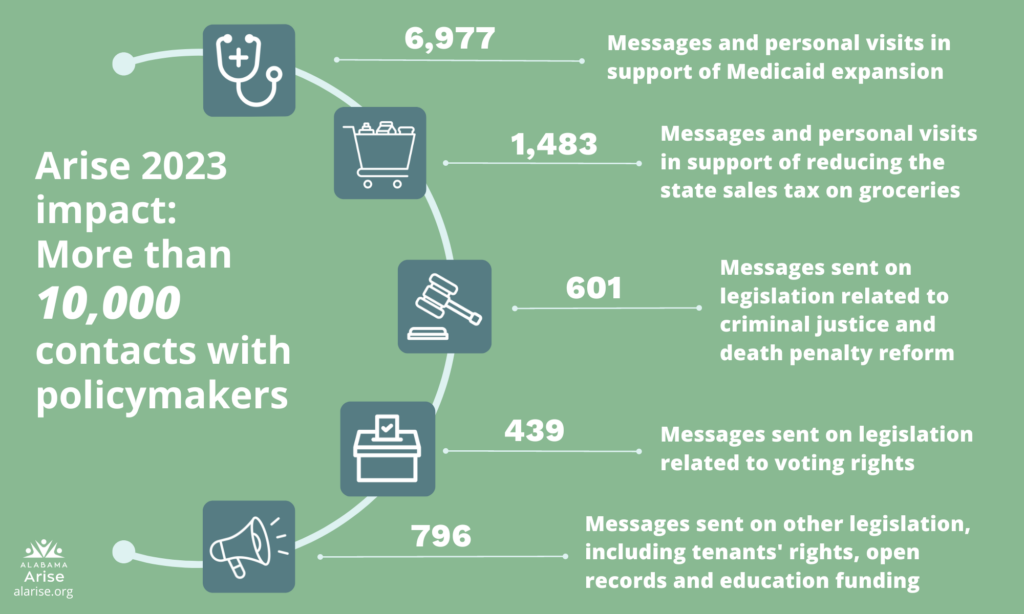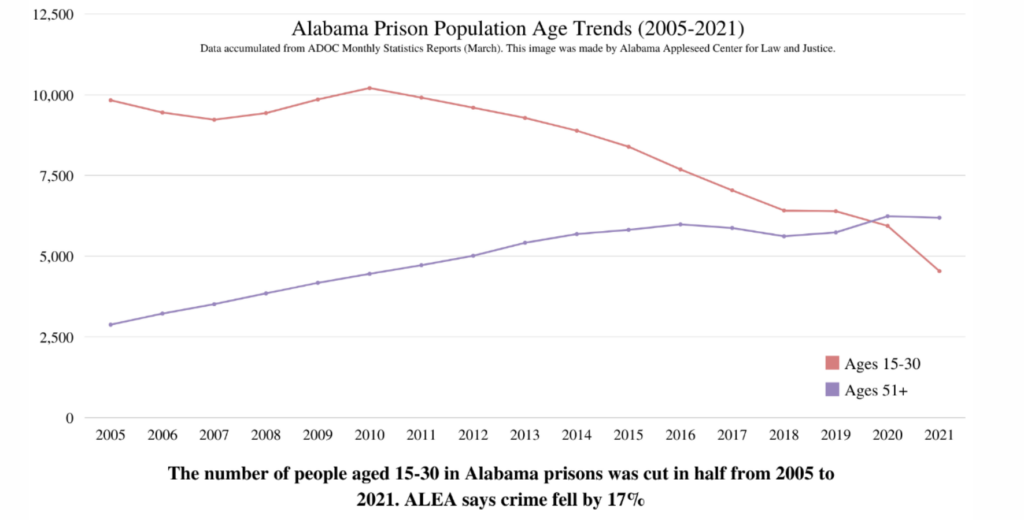The Alabama Legislature began its second regular session of the current quadrennium on Feb. 6. Lawmakers already have voted on numerous hot-button issues early in this session, and Alabama Arise anticipates that trend may continue. The upcoming presidential election, Alabama’s early primary date and other political factors may color what legislative leaders prioritize this year. The regular session will end no later than May 20.
Eliminate the state grocery tax
Arise was thrilled last year to help pass monumental legislation that reduced the state sales tax on groceries by 1 cent on Sept. 1, 2023. That law also authorized an additional 1-cent cut to the grocery tax in a future year. Combined, those reductions will cut the state grocery tax by half over time, from 4% to 2%.
Under the law, the second 1-cent reduction will occur in the first year when Education Trust Fund (ETF) revenues are projected to grow by 3.5% or more. Unfortunately, projections unveiled during this year’s budget hearings indicated ETF revenues will grow by only 2% in 2025. Thus, the additional 1-cent grocery tax reduction likely will occur in a future year rather than in September 2024.
This 3.5% growth provision, however, came as an amendment just before lawmakers passed the bill. The original version of the bill would have reduced the grocery tax by another 1 cent as long as annual ETF revenue growth was at least 2%. During a Feb. 12 meeting of Alabama’s Joint Study Commission on Grocery Taxation, Arise urged legislators to amend the law to reduce the growth threshold to 2%, as originally proposed. This change would allow Alabamians to receive the additional reduction sooner rather than later.
We will continue to push the Legislature to finish what it started with regard to cutting the grocery tax. We also will oppose budget legislation that we find alarming, such as the CHOOSE Act, which would divert at least $100 million of ETF money each year to non-public schools. At press time, the House had passed this proposal (HB 129, sponsored by Rep. Danny Garrett, R-Trussville), and a Senate committee had held a public hearing.
Protect voting rights and preserve child labor safeguards
Lawmakers have advanced two other troubling bills so far this year. The Senate passed SB 1, sponsored by Sen. Garlan Gudger, R-Cullman, which would criminalize many efforts to attempt to assist people with absentee voting. The Senate also passed SB 53, sponsored by Sen. Arthur Orr, R-Decatur, which would eliminate the eligibility to work form for 14- and 15-year-olds. This requirement is an important safeguard that helps protect children from exploitative child labor practices. Arise successfully advocated to amend SB 53 to require data collection about injuries and labor violations.
Arise has reason to be concerned about both of these measures. We have devoted the early weeks of this session to educating Arise members, legislators and communities about these bills’ harms.
Advance criminal justice reform
It is an understatement to say that Alabama’s criminal justice system is in need of reform. A U.S. Department of Justice lawsuit accuses our state’s overcrowded prison system of violating the Constitution. And our state’s parole rates are abysmally low – just 8% in fiscal year 2023.
With those factors and others, Arise has a lot to keep us busy with regard to criminal justice reform. Thus, we will be devoting a significant portion of our time this year to legislation that would address issues like these. We also will support legislation to reform our death penalty laws. And we will support efforts to reform the felony murder rule, which allows a person to be convicted of first-degree murder even if they did not intend to or did not actually kill anyone.
Fund public transportation
Inadequate funding for public transportation keeps thousands of people across Alabama from meeting basic needs. Though lawmakers created the Alabama Public Transportation Trust Fund (PTTF) in 2018 to help fix our transit issues, the Legislature has never funded it. That is why Arise is urging lawmakers to include a General Fund appropriation for public transportation to rectify this oversight.
Ultimately, the return on transit investment makes allocating money to the PTTF a wise use of public funds. In fact, every $1 million invested in transit creates 49 full-time jobs, many of which are long-term jobs with good pay. An appropriation of up to $50 million from the General Fund to the PTTF also could empower Alabama to double its investment for operation expenses and to draw down up to $200 million of federal matching funds for capital improvements.
Arise will do all we can this year to educate lawmakers on the benefits of investing in public transportation. We also will highlight how a lack of adequate public transit limits workforce participation and shared prosperity across Alabama.



